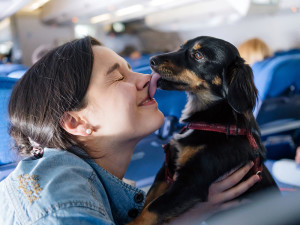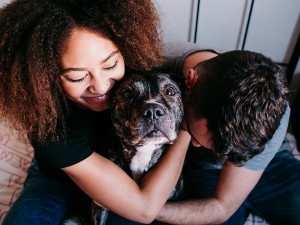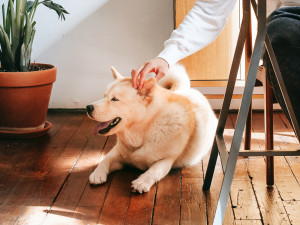Why Does My Dog Lick My Feet?
OK, dude, that’s a little gross...

Share Article
In This Article:
Why Do Dogs Lick Humans Feet? What Does It Mean When Dogs Lick Your Feet? Is It Bad For My Dog To Lick My Feet? How To Stop My Dog From Licking My Feet
Ever wonder why the moment you get home from a sweaty run and change your shoes is also the moment your dog decides to go to town on your feet? Same. While many of us pet parents take dog kisses as a compliment, when a dog licks your feet, it can feel sort of weird — and maybe even a little bit gross (but hey, we’re not judging if you low-key enjoy it). But why do our canine companions engage in this peculiar behavior?
There’s not one clear answer, but rather, many potential explanations. Let’s uncover why dogs lick your feet, what it means, and how you can stop it from happening in the future.
Why do dogs lick human feet?
Licking is a natural behavior in dogs, often associated with smell, affection, attention seeking, or taste. Your feet are rich in trapped odors and pheromones, so if you’ve been walking in sandals or are barefoot, there are scents that telegraph to your dog where you’ve been. And that leads us to our first reason why dogs lick feet: They’re engaging their sense of smell.

Smell
A dog’s sense of smellopens in new tab is the most developed sense they have due to their unique anatomy. Dogs have roughly 300 million olfactory receptors in their noses, compared to only about six million in humans. The anatomy of a dog’s nose funnels about 12 percent of each breath going to the olfactory (smelling) region, and the rest to the lungs.
“Both of these factors enhance the ability of dogs to detect current scents as well as a historical picture of who or what has been in the area in the past,” says Dr. Wendy Hauser, veterinarian and veterinary spokesperson for ASPCA Pet Health Insuranceopens in new tab. “Using smell in both ways helps the dog create a real time roadmap of threats and opportunities.”
Hauser explains that the odors that arise from a human’s foot are unique and may be used by the dog to identify a favorite human (congratulations, that’s you). Dogs are also amazing at recognizing different physiological states through their sense of smell, including the emotional state of a human, illnesses, and even the stages in a reproductive cycle. Simply put, licking your feet may mean your pup is just trying to figure out what you’ve been up to and how you’re feeling.
Bonding
When your dog licks your feet, they may also be trying to bond with you. In fact, feet-licking is a behavior seen in dog-to-dog interactions, too.
“Dogs traditionally lick as a way of showing affection to other bonded dogs,” Hauser says. “It makes sense that the dog might extend this behavior to the human members of [their] pack. This can also be reinforced by the human’s behavior—if they laugh or enjoy it, the dog receives positive feedback.”
That’s right, if giggles and sweet talk follow when your dogs licks your feet, you’re pretty much telling them to keep going.
Attention
Dogs are known for their unique ways of seeking attention, and licking your feet might just be one of them. This behavior could be their way of saying, "Hey, pay attention to me!" Dogs often lick as a form of communication, whether it's to show affection, seek reassurance, or simply to get your attention. So, the next time your canine companion starts licking your feet, it might just be their way of telling you they want your attention.
Taste
This may seem kind of gross, but your dog may just love the way your feet taste. After all, dogs are known for their keen sense of smell and taste, and they may find the saltiness or scent of your feet appealing.
Dogs explore the world around them through taste, so they might be curious to sample different scents and flavors, including those on your feet. While it can seem a bit strange to us, licking your feet could simply be your dog’s way of indulging (literally) in their natural instincts to explore and taste new things.
What does it mean when dogs lick your feet?
Dogs licking your feet can convey various messages, and it’s often a multi-faceted behavior. As discussed, they might be using their acute sense of smell to gather information about your whereabouts or emotions.
Your pup also might be trying to establish a connection with you, seek attention, or, in some cases, simply savor the taste of your feet. And while licking can communicate different intentions, it doesn’t always have a specific meaning and may vary from one dog to another. Ultimately, understanding your dog's behavior and context can provide insights into their motivations.
Is it bad for your dog to lick your feet?
While most of the time a dog licking your feet just means they’re curious about you or trying to bond, dogs may also lick when they are stressed or anxious. In this case, licking your feet could be a call for help. If you notice other signs of anxiety, such as panting, pacing, or avoidance behaviors, it’s probably best to reach out to a veterinarian to see what’s going on. It’s also important to be aware of what’s actually on your feet.
“If the human has any products on their feet, like anti-fungal or other medications, it could be harmful to the dog to ingest those products,” Hauser explains.
Dr. Hauser also advises that it could be harmful to humans if your dog licks open wounds, as this could lead to bacterial transfer from the mouth to the wound. At the end of the day, we don’t want this to become a chronic habit, because it’s probably not good for your dog to fixate on something and it’s probably not good for your feet to be constantly licked. Thankfully, there are lots of other ways to bond with your dog that don’t include your feet.
How to stop your dog from licking your feet
There are a couple of ways to train a dog not to lick feet. The easiest fix is to just wear shoes, socks, or slippers — but if that’s not for you, try some of the following methods. Just make sure you’re consistent with all members of the family so you send the same message.
Redirect their attention
Offering an alternative activity can effectively redirect your dog’s attention from licking your feet. Introduce a stimulating chew toy, such as a treat-filled Kong or a food puzzle ball. At the same time, gently move your feet away from your dog to reinforce the behavior of focusing on the toy rather than licking.
Use positive reinforcement
Once your dog moves away from your feet and does something else, you can give them praise and a treat to reward them. With consistent redirection and positive reinforcement, your dog can learn to associate the chew toy with a rewarding and appropriate activity, reducing the urge to lick your feet.
Teach a cue
Cues such as “out” and “leave it” can be extremely helpful in situations where you don’t want your dog messing with something. Start by associating the cue with the desired action, using positive reinforcement techniques such as treats and praise to encourage compliance. With practice, your dog will learn to respond to these cues, allowing you to effectively communicate your expectations and manage their behavior in various situations, not just feet-licking ones.
Provide mental and physical stimulation
A bored dog will always get into things that might not be good for them—your feet included. Make sure you’re providing your dog with enough mental and physical stimulation. Engage them in regular play sessions, interactive toys, and brain games to keep their mind and body active and stimulated. It’s also important to make sure they get exercise through walks, runs, or playtime in the yard to help channel their energy in a positive way. And lastly, maybe it’s time to smell your own feet...
“Pay attention to your foot hygiene,” Hauser says. “Why is your dog so interested? Maybe you need to wash your feet more often, use odor absorbing socks, or breathable shoes.”
At the end of the day, while your dog licking your feet is likely harmless, it could lead to unfortunate consequences for both of you. By understanding the reasons behind this behavior and implementing positive training techniques, you can foster a stronger bond with your pup while ensuring their well-being and preventing potential discomfort for yourself.
FAQs (People also ask):
Why does my dog lick me?
Dogs lick their pet parents for various reasons, often as a form of communication or affection. Licking can be a way for dogs to show submission, seek attention, or express their love and affection toward their human companions.
Why do dogs lick their feet?
Dogs lick their feet for a variety of reasons, ranging from grooming and cleaning to addressing irritation or discomfort. Just like humans, dogs can experience itchiness or discomfort in their feet due to various factors such as allergies, injuries, or skin conditions. Licking their feet helps them to alleviate itching, clean their paws, or soothe any irritation they may be experiencing.
Do dogs lick you if they love you?
Yes, dogs often lick their pet parents as a way to show affection and love. Licking is a natural behavior in dogs, and they may lick their humans’ faces, hands, or other body parts as a gesture of love and closeness.
References:
Canine Olfaction: Physiology, Behavior, and Possibilities for Practical Applicationsopens in new tab

Courtney Elliott
Courtney Elliott, a proud Cleveland native living in Manhattan, blends her decade of writing and editing expertise with her unshakable devotion as a pet parent to her French Bulldog, Gus. When she’s not at her desk, you’ll find her frolicking in Central Park or engrossed in a good book at a local coffee shop.
Related articles
![A woman sitting on a floor playing with her dogs.]()
How to Know if Your Dog Has Imprinted on You
If they’re following you around like your shadow, there’s a reason for that.
![weird dog rolling in poop]()
7 Weird Dog Behaviors Explained
Chasing their tails, eating grass, and rolling in garbage — should you worry?
Do Dogs Like Getting Kisses?
No, your dog might not like receiving kisses as much as you like giving them.
![Woman hugging her dog.]()
Most Dogs Don’t Really Like Being Hugged, New Study Finds
Yeah, it’s kind of heartbreaking, but your loving embrace might be stressing your pup out.
![Couple hugs their merle Boxer]()
How to Improve Your Relationship with Your Dog
Animal behaviorist Dr. Karen B. London on how to strengthen your pet-parent bond.
![Unrecognizable man sitting at desk petting his dog]()
How to Pet a Dog — Yes, You Do Need Lessons
There’s a difference between being affectionate and being annoying.










